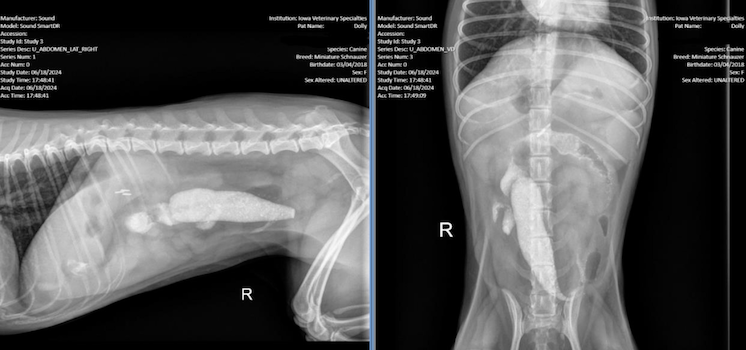Sand Impaction
Written by Ashley Rone • 2024 Scholar
History
Dolly is a 6-year-old intact female miniature schnauzer presenting to the ER for ingesting sand. She was at the beach on Sunday, June 12th playing fetch. She ingested sand while playing fetch and was brought to the rDVM on June 17th where she received x-rays. Per the rDVM she was not obstructed at this time and her intestines were glowing. She was given a Cerenia injection and subcutaneous fluids and sent home with oral Cerenia that was not given per owner. After the visit with the rDVM, she had very low energy and was not interested in eating. Owner attempted to give chicken broth with a syringe, but she was not interested. She had been shaking and seemed very uncomfortable. She hadn’t had a bowel movement since Sunday evening. She did vomit once before coming in and the owner described it as a foamy bile. Patient doesn’t have any allergies or take any medications.
Initial Physical Exam:
- Temperature: 100.2 (normal=100-102.5)
- Heart Rate: 130 (normal dog=60-160, normal cat= 120-240)
- Respiration: 24 (normal dog=10-40, normal cat= 16-40)
- MM: light pink <2 seconds
- Weight: 3.31 kg
Dolly had bloodwork done at the rDVM.
- Body Condition: 4/9
- Eyes: No significant findings
- Ears: No significant findings
- Mouth: Hypersalivation
- Skin/Hair: Healthy skin and haircoat
- Abdomen: Very painful
- Orthopedic: Ambulatory x4, hunched posture
- Lymph node: No significant findings
- Heart/Cardiovascular: No murmur or arrhythmia auscultated
- Lungs/Respiratory: Normal bronchovesicular sound bilaterally
- Nervous System: Dull, lethargic
- Urinary/Reproductive: No significant findings
- Pain Score: 3/4
Bloodwork
Initial Big 4 to start showed- glucose: 134, lactate: 1.5, PCV: 56, TP: 7, BP: 119 mmHg
Follow-up Big 4- glucose: 144, lactate: 0.8, PCV: 47, TP: 5.2, BP: 130 mmHg
Diagnostics
(Radiology Reports taken directly from Idexx)
June 18th, 2024- three view x-rays were taken
- Findings: There was marked segmental abnormal distention of loops of small intestine within the caudal abdomen with a large amount of pulvenized mineral material in addition to fluid. The stomach was mildly filled with gas and a small amount of mineral material. Other loops of small intestine are mildly gas and fluid filled. There is fluid in the colon.
- Conclusions: Obstruction or partial obstruction of small intestine with sand
is highly likely. Foreign material can sometimes pass, but surgery may be
necessary. Follow-up images recommended after 4-6 hours of fluid therapy.

June 18th, 2024- three view x-rays were taken 6 hours later
- Findings: The stomach contained a mild volume of gas and a similar small
volume of mineral opacity. The small intestine contained a similarly dilated
small intestinal segment identified in the mid-abdomen that contains a large
accumulation of similar mineral opacity. Fewer mildly dilated small intestinal
segments are identified compared to previous. There are a few small
intestinal segments that contain small accumulations of mineral opacity. In
the colon there is an accumulation of mineral opacity identified within the
ascending, transverse, and proximal descending colon compared to the
previous study. A larger volume of gas is noted throughout the descending
duodenum. There is a small accumulation of mineral opacity within the
lumen of the distal descending colon cranial to the pelvic inlet. A U-shaped
mineral opaque structure is suspected to represent mineral opacity within
the cecal lumen. - Conclusions: The dilated intestinal segment is suspected to represent ileum.
There is passage of mineral opacity into the cecum and proximal colon
compared to the previous studies. Consider a persistent partial small
intestinal mechanical obstruction.
Treatment
- Initial treatment- an IV catheter was placed, methadone was given IM for pain, ondansetron was given IV for nausea, cerenia was given IV for nausea, and she was started on IV fluids (phylyte).
- Next day treatment- Performed several rectal enemas to try and break up the sand to flush out of the intestines.
- Final treatment- An abdominal exploratory surgery was ultimately performed due to the lack of movement of the sand in the intestines. The sand was able to be manually milked out of her intestines through the colon. A needle with saline was inserted into the ileum to flush out the remaining sand through the intestinal tract.
Discharge
- Medications: Dolly was discharged on cerenia for nausea, gabapentin for pain and mild sedation, carprofen for pain, codeine for pain, entyce as an appetite stimulate, and trazodone for sedation.
- Recheck: It was recommended to have a recheck of the surgical incision in 12-14 days and relayed to recheck sooner if owner noticed any lethargy, pain, swelling, opening of the surgical site, excessive bruising, etc.
- Diet: Normal
- Exercise: Restricted for 2 weeks. No running, jumping, rough play, etc.
Summary
Sand impaction is a complex ailment that requires repetitive diagnostics such as blood work and x-rays to monitor the animal’s condition. Because of the complexity of sand ingestion, treatment depends on the severity of the impaction which can be monitored with the use of interval radiographs. Some cases can be managed with only medical intervention and other cases require surgical intervention like in Dolly’s case. If dogs are diagnosed and treated early the prognosis is generally very good.
References & Citations
- Moles, A. D., McGhie, J. A., Schaaf, O. R., & Read, R. (2010). Sand impaction of the small intestine in eight dogs. Journal of Small Animal Practice, 51(1), 29-33.
- Muhammad, S. T., Audu, S. W., Jahun, B. M., Lawal, M., & Adawa, D. A. Y. (2014). Diagnosis and management of sand impaction of the large intestine in an Alsatian puppy.
- Papazoglou, L. G., Patsikas, M. N., Papadopoulou, P., Savas, I., Petanides, T., & Rallis, T. (2004). Intestinal obstruction due to sand in a dog. Veterinary record, 155(25), 809-809.


